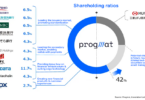Yesterday, public distributed ledger Hedera Hashgraph announced that UK’s University College London (UCL) is joining its governing council, the first educational institute to participate as a member. Only governing council members run nodes with permission to write to the distributed ledger. UCL is among the top five universities in the UK and has been engaged in blockchain activities since 2016 when it set up the Centre for Blockchain Technologies.
The Hedera Governing Council aims to develop a decentralized governance model for the public ledger. It previously said it would have 39 members from 18 different sectors. UCL now brings the total to 13, joining other council members such as Boeing, Deutsche Telekom, DLA Piper, FIS (WorldPay), Google, IBM, Magalu, Nomura, Swirlds, Swisscom Blockchain, Tata Communications and Wipro.
Hedera Hashgraph is not a blockchain but a hashgraph developed for enterprise solutions. Hedera’s distributed ledger technology (DLT) code is proprietary, and it claims to be more scalable than current proof of work blockchains. The platform raised around $124 million before its launch last year.
“The addition of UCL to the Hedera Governing Council marks a historic moment,” said Mance Harmon, CEO, and co-founder of Hedera Hashgraph. “As the very first university on the council, they help Hedera expand our reach into the education sector, with the engagement of a leading global educational institution already making waves in the DLT space.”
The governing council is tasked with ensuring the decentralization of the network by eliminating the risk of forks and guaranteeing the integrity of the codebase. UCL, like other council members, will run a node on the Hedera Hashgraph network.
“UCL’s membership on the council demonstrates our commitment to diversification of governance, and highlights our existing presence across multiple other industries including telecommunications, cloud computing, aviation, supply chain, and IT,” added Harmon.
A few weeks ago, the blockchain consortium INATBA launched a task force to develop blockchain applications for COVID-19 in collaboration with the European Commission and University College London.
In 2018 UCL partnered with Ripple for the University Blockchain Research Initiative. Meanwhile, IC3 is another initiative supported by faculty from UCL and other universities. London-based digital asset exchange Archax has a partnership with UCL.
“We are proud to be joining the Hedera Governing Council to steward the next generation of DLT. The UCL CBT is ready to embrace this open, decentralized governance model and Hedera’s innovative technological solutions to real-world problems,” said Paolo Tasca, Executive Director at UCL Centre for Blockchain Technologies.






